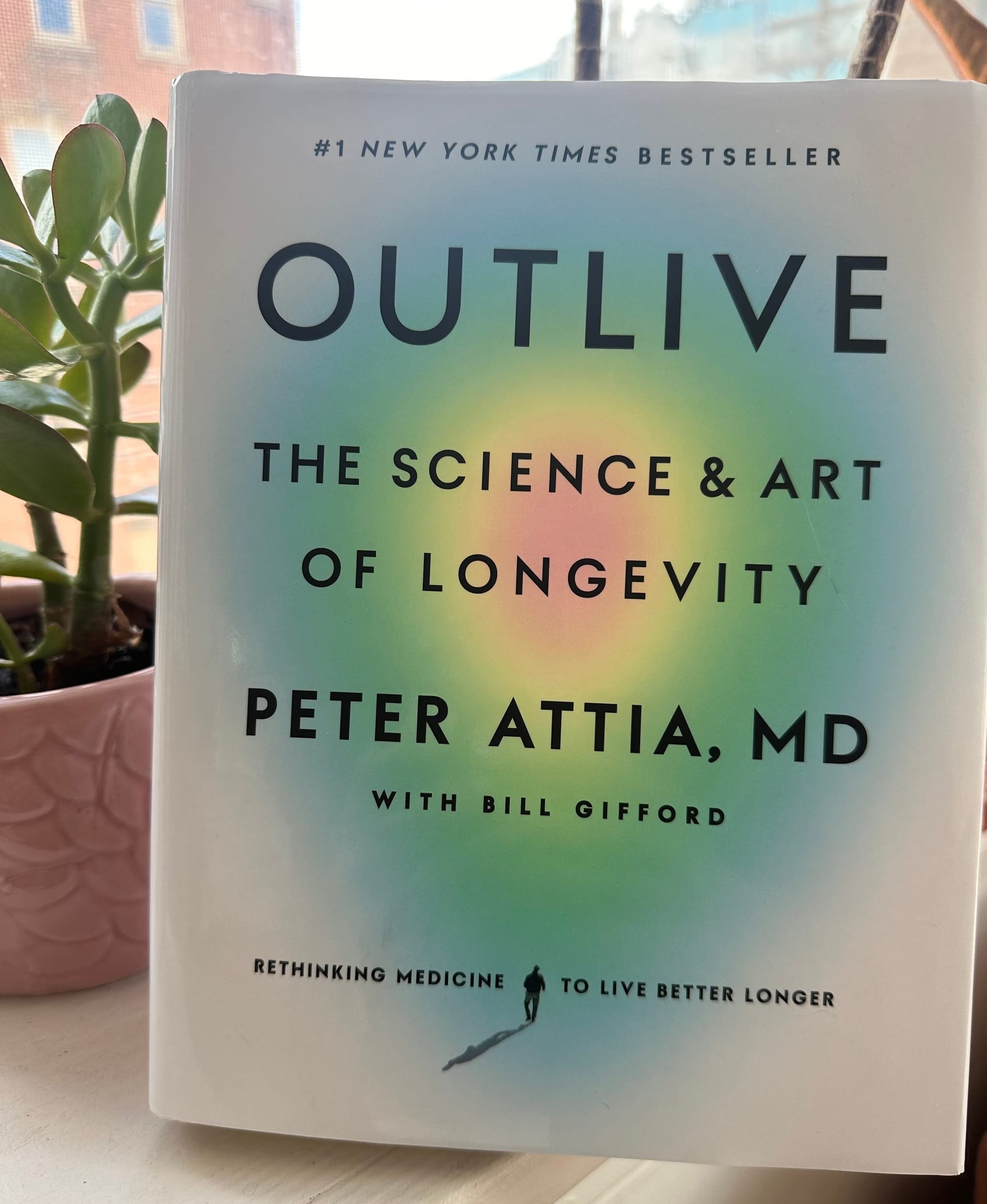The Most Powerful Longevity Drug
When I discovered that Peter Attia had been working on a book for several years, I knew it would be jam-packed with useful information for living a healthier life. I didn't know how strong a claim Dr. Attia would make regarding how exercise can improve your life.

When I discovered that Peter Attia had been working on a book for several years, I knew it would be jam-packed with useful information for living a healthier life. I didn't know how strong a claim Dr. Attia would make regarding how exercise can improve your life and how prescriptive he would be when discussing the best exercises to increase your health span. To summarize his stance on exercise in Chapter 11 of his book, Outlive:
"Exercise has the greatest power to determine how you will live out the rest of your life."
Also,
"if you adopt only one new set of habits based on reading this book, it must be in the realm of exercise."
Let's just say I've never changed my exercise routines so fast. . . Even though I was eager to continue what I had been doing for several years (because it seemingly "worked"), I also felt like I couldn't ignore the science. For some background, Peter Attia is a licensed medical doctor specializing in longevity and what he describes as Medicine 3.0, applying tactics for being proactive instead of reactive, to increase health span in addition to lifespan - it's not just about living longer, it's about living a healthy fulfilled life until our death. Of course, Peter has been a guest multiple times on my favorite podcast for learning something new, which is how I was first introduced to him.
Peter explains that if longevity is the goal, you need to train like you're preparing for the Centenarian Decathlon i.e. identify ten activities you want to be able to do in your late age and work backward to see what you should be doing now i.e. if you want to be able to hike 1.5 miles when you're 90 years old, what should your VO2 max be when you're 35?
What he's found is there are three key areas to focus on with your exercise regimen: aerobic endurance and efficiency (aka cardio in the form of Zone 2 and VO2 max), strength, and stability. In Part 1, I'll discuss Zone 2 cardio and how I've implemented this in my exercise routine. I'll discuss the 3 other exercise types in Part 2 next week.
Aerobic Efficiency: Zone 2
You can think of Zone 2 cardio as the foundation of your exercise routine. This and your strength workouts should take up the majority of your workout time. Not only is Zone 2 training important to build your endurance but from a health standpoint, it specifically improves mitochondrial health as well as glucose uptake, among other benefits. It's fundamental for both athletes and non-athletes and possibly the best part is that it's a very easy form of exercise to do, even for someone who is typically sedentary.
What: Any form of cardio (walking, running, biking, etc.) where your heart rate (HR) is in Zone 2 (of 5 zones) i.e. a pace somewhere between easy and moderate. Zone 2 is around 70-85% of your peak HR. Put another way, Zone 2 is the maximum level of effort you can maintain without accumulating lactate (aka lactic acid.) If you're feeling the burn, you're likely going too hard.
Duration: 3 hrs (or four 45-minute sessions) per week
How I've implemented this: I used to walk in the morning, but for the entirety of these walks, my heart rate (HR) was in Zone 1. So switched my 45 - 60 min morning walks to morning runs. To achieve a Zone 2 HR as quickly as possible, I start my run faster than I normally would. I then use the HR display on my Apple watch to maintain Zone 2 - If I see that I'm in Zone 3, I slow down; if I'm in Zone 1, I speed up.
I try to do three 45 to 60-minute "Zone 2" runs during the week and a longer (1 - 2 hr) run on Saturday or Sunday. My Zone 2 HR calculated by Apple Fitness = 130 - 142 beats per minute (BPM).
I've only implemented this practice for 3 weeks, however, I can already see a marked difference in my endurance i.e. I can maintain a higher speed for longer. My Zone 2 pace has also decreased from around a 10-minute mile to a 9-minute mile or less.
More Exercise, More Life
Need more motivation to get started or add more exercise to your life? Here are some more tidbits from Peter.
- Any amount of exercise is good for you: "There are reams of data supporting the notion that even a fairly minimal amount of exercise can lengthen your life by several years." and "The benefits of exercise begin with any amount of activity north of zero - even brisk walking - and go up from there."
- The more cardio, the better: "Cardiorespiratory fitness is inversely associated with long-term mortality with no observed upper limit of benefit."
- The benefits of exercise extend beyond physical: "Not only does it reverse physical decline, but it can slow or reverse cognitive decline as well."
- The longevity effects of exercise are profound: "Study after study has found that regular exercisers live as much as a decade longer than sedentary people."
- Exercise is as good, if not better than medicine. Don't like spending time in hospitals? Start exercising: "The fitter you are, the lower your risk of death. Again, there is no other intervention, drug or otherwise, that can rival this magnitude of benefit. Exercise is so effective against diseases of aging - the Horsemen - that it has often been compared to medicine."
What I find so motivating from reading this book is the various findings that longevity is malleable. Yes, some people have genes that may make them more susceptible to disease, but there are many factors in our control that can prevent the onset of these diseases or their severity - of course one of them being exercise.
The Best Time to Start is Now
I want to reiterate that any amount of exercise is good for you; there isn't a minimum threshold. If you're just starting out, I suggest borrowing a tactic from my favorite book on the topic of habit creation and using identify-based habits to form an exercise habit. Speaking of Atomic Habits . . . the author, James Clear, recently created a habit app called Atoms. Albeit expensive, it's free for the first month and really does a great job of helping you understand how to form habits that stick. See you next week!
